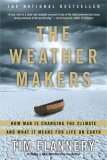Summary | Excerpt | Reading Guide | Reviews | Beyond the book | Read-Alikes | Genres & Themes | Author Bio

How Societies Choose to Fail or Succeed
by Jared DiamondBrilliant, illuminating, and immensely absorbing, Collapse is destined to take its place as one of the essential books of our time, raising the urgent question: How can our world best avoid committing ecological suicide?
In his million-copy bestseller Guns, Germs, and Steel, Jared Diamond
examined how andwhy Western civilizations developed the technologies and
immunities that allowed them to dominate much of the world. Now in this
brilliant companion volume, Diamond probes the other side of the equation: What
caused some of the great civilizations of the past to collapse into ruin, and
what can we learn from their fates?
As in Guns, Germs, and Steel, Diamond weaves an all-encompassing
global thesis through a series of fascinating historical-cultural narratives.
Moving from the Polynesian cultures on Easter Island to the flourishing American
civilizations of the Anasazi and the Maya and finally to the doomed Viking
colony on Greenland, Diamond traces the fundamental pattern of catastrophe.
Environmental damage, climate change, rapid population growth, and unwise
political choices were all factors in the demise of these societies, but other
societies found solutions and persisted. Similar problems face us today and have
already brought disaster to Rwanda and Haiti, even as China and Australia are
trying to cope in innovative ways. Despite our own society's apparently
inexhaustible wealth and unrivaled political power, ominous warning signs have
begun to emerge even in ecologically robust areas like Montana.
Brilliant, illuminating, and immensely absorbing, Collapse is destined
to take its place as one of the essential books of our time, raising the urgent
question: How can our world best avoid committing ecological suicide?
Diamond's bottom line is clear - for all our technology and electronic widgets, we are still bound to nature and reliant on it. As always, you can judge this book for yourself by reading a substantial excerpt at BookBrowse, which will give you an understanding of the book's overall premise sufficient to hold your own in conversation on the subject with most people!..continued
Full Review
(323 words)
This review is available to non-members for a limited time. For full access,
become a member today.
(Reviewed by BookBrowse Review Team).
"I've set myself the modest task of trying to explain the broad pattern
of human history, on all the continents, for the last 13,000 years. Why did
history take such different evolutionary courses for peoples of different
continents? This problem has fascinated me for a long time, but it's now ripe
for a new synthesis because of recent advances in many fields seemingly remote
from history, including molecular biology, plant and animal genetics and
biogeography, archaeology, and linguistics....." - Jared Diamond
Read the full text of Diamond's talk to
The Edge Foundation
- an interesting looking organization that 'seeks to promote inquiry into and
discussion of intellectual, philosophical, artistic, and ...
This "beyond the book" feature is available to non-members for a limited time. Join today for full access.

If you liked Collapse, try these:

by Tim Flannery
Published 2006
The Weather Makers is both an urgent warning and a call to arms, outlining the history of climate change, how it will unfold over the next century, and what we can do to prevent a cataclysmic future. Along with a history of climate change, Tim Flannery offers specific suggestions for action for both lawmakers and individuals.

by Frances Moore Lappe, Anna Lappe
Published 2003
Join one of our country's foremost activist thinkers, Frances Moore Lappé, and her daughter, Anna, on a trip around this small planet. This follow up to The Next Diet For A Small Planet helps each of us find new courage to trust ourselves and choose the world we want.
Life is the garment we continually alter, but which never seems to fit.
Click Here to find out who said this, as well as discovering other famous literary quotes!